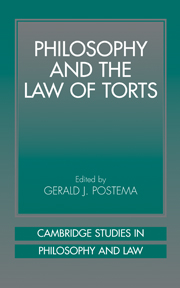Book contents
- Frontmatter
- Contents
- Contributors
- 1 Introduction: Search for an Explanatory Theory of Torts
- 2 A Social Contract Conception of the Tort Law of Accidents
- 3 Responsibility for Outcomes, Risk, and the Law of Torts
- 4 The Significance of Doing and Suffering
- 5 Tort Law and Tort Theory: Preliminary Reflections on Method
- 6 Corrective Justice in an Age of Mass Torts
- 7 Economics, Moral Philosophy, and the Positive Analysis of Tort Law
- 8 Pluralism in Tort and Accident Law: Towards a Reasonable Accommodation
- References
- Index
6 - Corrective Justice in an Age of Mass Torts
Published online by Cambridge University Press: 01 July 2009
- Frontmatter
- Contents
- Contributors
- 1 Introduction: Search for an Explanatory Theory of Torts
- 2 A Social Contract Conception of the Tort Law of Accidents
- 3 Responsibility for Outcomes, Risk, and the Law of Torts
- 4 The Significance of Doing and Suffering
- 5 Tort Law and Tort Theory: Preliminary Reflections on Method
- 6 Corrective Justice in an Age of Mass Torts
- 7 Economics, Moral Philosophy, and the Positive Analysis of Tort Law
- 8 Pluralism in Tort and Accident Law: Towards a Reasonable Accommodation
- References
- Index
Summary
Introduction
Corrective justice theory has been the subject of many, often inconsistent, attacks. Sometimes it is criticized on the ground that it provides no practical guidance as to how cutting edge issues of tort law ought to be resolved. Sometimes it is criticized for providing only normative guidance, and failing to accommodate what the tort law actually says. Sometimes it is criticized for both at once. And sometimes it is criticized for being simply off track – for missing what is central in law – the drive of money and deep pockets.
These objections are nicely exemplified in discussions of contemporary mass tort law. The question arises as to whether a plaintiff who suffered injuries from a defective product should ever be able to recover from a manufacturer of that type of product, even if the plaintiff cannot prove that the particular product or products that injured her were manufactured by the defendant. Corrective justice theory, it is sometimes complained, reveals only the rationale for the structures of the law we have, and does not tell us whether we should extend beyond that structure. Hence, corrective justice theory is patently correct that within the conceptual framework of the common law of torts, causation is required and liability would be denied in these cases. The question is whether the conceptual framework of corrective justice is one to which we must be limited. Corrective justice does not help with this.
- Type
- Chapter
- Information
- Philosophy and the Law of Torts , pp. 214 - 249Publisher: Cambridge University PressPrint publication year: 2001
- 6
- Cited by

